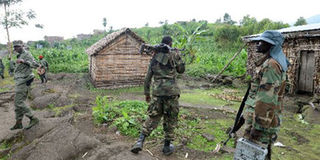South African snipers hit M23 targets in DR Congo

M23 rebel group fighters. South African snipers killed six rebels on August 29,2003. PHOTO/AFP
What you need to know:
- South African soldiers are part of a UN intervention brigade, which has an unprecedented mandate to battle the armed movements in eastern Congo
- Three South African soldiers had been injured in the clashes
JOHANNESBURG
UN-deployed South African snipers have killed six M23 rebels in the eastern Democratic Republic of Congo, a military union official said Thursday.
"We hit targets on at least six occasions with snipers," said South African Defence Union national secretary Pikkie Greeff. "We got six kills, to put it coarsely."
"In one case the target was 2.2 kilometres (1.4 miles) away," he added. "On Saturday a South African sniper took out a machine gun post."
Defence Force spokesman Brigadier General Xolani Mabanga confirmed South Africa forces had engaged rebels, but could not elaborate on the sniper reports.
South African soldiers are part of a UN intervention brigade, which has an unprecedented mandate to battle the armed movements long active in eastern Congo.
They are fighting the M23 rebel movement, a predominantly ethnic Tutsi force that deserted from the army last year and has been battling the regular army in the Goma area in sporadic clashes that broke a July truce.
Greeff said that on Wednesday Russian-made Mi-24P helicopters belonging to the Ukrainian Air Force also joined the airstrikes on rebel targets around Goma.
And Mabanga told AFP: "Yesterday components comprising Tanzanian and South African companies provided fire support in forms of artillery bombardment and mortar shells together with gunships and airstrikes."
SOUTH AFRICAN SOLDIERS INJURED
President Jacob Zuma on Thursday confirmed three South African soldiers had been injured in the clashes.
"Three of our soldiers have been injured in the conflict since the weekend, largely from shrapnel wounds. None have been seriously wounded."
Mabanga said the injuries were sustained though bombs and exchanges of fire.
"One South African soldier suffered a bullet wound on the limb. Later another South African soldier suffered a wound from shrapnel," he added.
South Africa's Times newspaper quoted an unnamed soldier as saying the UN-backed assault came after the M23 attacked supply lines between Goma and Rwanda.
"Our snipers were specifically targeting rebel command-and-control posts," the soldier said.
"It appears from information coming from the front that the officers were busy planning attacks on DRC and UN bases," he added.
Within weeks South Africa is expected to deploy two Rooivalk helicopters to the DRC, according to the defence union's Greeff.
"Those things have much more firing power than the Mi-24P," he said.





